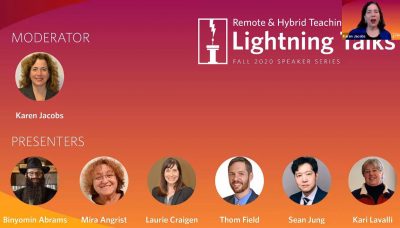While college campuses would normally be bustling during the fall, the COVID-19 pandemic has changed everything from the way students communicate to the way they learn. At Boston University, that’s no different — but each department had found its own techniques to adjust based on its educational needs.

This semester’s speaker series on Learn from Anywhere invited faculty to discuss the ways BU has adapted to a remote learning environment. The most recent installment held Friday, “Managing the LfA Experience Part 2,” was a follow-up to an October discussion.
The talks, co-hosted by Digital Learning and Innovation and The Center for Teaching and Learning, focused on changes to the University’s academic environment as a result of its new hybrid modality.
The Center’s director, Deborah Breen, wrote in an email that each of the six speakers were specifically chosen from varied colleges within BU to present a full picture of the LfA curriculum.
“We try to find speakers from diverse backgrounds, representing different disciplines and approaches, and from across BU’s campuses,” Breen wrote. “There was a good cross-section of people and approaches represented and they had quite different teaching and learning stories to tell.”
Binyomin Abrams, master lecturer of chemistry in the College of Arts and Sciences, began the talk by sharing his experiences with a new lab environment and, in turn, new learning assistant lab surrogates — who attend labs in person to substitute for the virtual students — to simulate the lab experience.
Virtual students will direct the learning assistant, a student who has already taken the chemistry course, to complete their lab experiments. Remote students must give exact instructions, Abrams said, because LAs are the ones technically doing the lab.
This lab technique has produced satisfactory test results, Abrams said, and has received positive reviews from students themselves.
“Both cohorts, in-person and remote, score equivalently according to all assessment metrics we’ve used,” Abrams said. “Maybe the most exciting part is that the remote students report an unexpectedly high level of community engagement and satisfaction with their experience.”
Abrams said remote students are succeeding thanks to the LAs, who are all taking a pedagogy course in the Wheelock College of Education and Human Development. Because of this, he said, LAs are attentive to exact instructions and can ask important questions as they conduct the labs.
Associate Dean for Digital Learning and Innovation Karen Jacobs was the moderator for the talk. Jacobs said such discussions can be useful during this time for faculty as well as students.
“I love that BU has taken the lead on providing resources to faculty, and students are attending also,” Jacobs said in an interview. “It’s great to give faculty a platform to share creative and innovative things that they’ve been doing.”
Panelists said some of these LfA innovations include a School of Medicine seminar series where students can meet with faculty to better engage with the school, and the Hebrew department beginning each class with “game-based learning” to test students’ language proficiency.
School of Hospitality Administration assistant professor Sean Jung spoke during the panel about the process with which his department catered LfA to hospitality students’ specific needs. He said hospitality students typically enjoy working with groups instead of individual work, for example, so applications included incorporating breakout rooms and encouraging them to leave their cameras on during class.
In an interview, Jung said he believes because LfA is so new, it is important to converse about the way it is impacting BU’s curriculum this semester.
“Everybody has new ideas at this point, so it’s great to communicate with other departments to see how they are actually doing their LfA models,” Jung said. “I definitely think that there is a lot of things to learn from each of the departments.”
Faculty and students alike can benefit from attending the talks, Jung said, because students can offer feedback and faculty can take those comments to improve their curriculums. He said the LfA model cannot work without collaboration from both of these major cohorts within the BU community.
“Having more students to come and also do some presentations really helps the faculty members to know exactly what the students are thinking,” Jung said. “We can actually have a feedback back-and-forth with each other to improve each other.”

















































































































